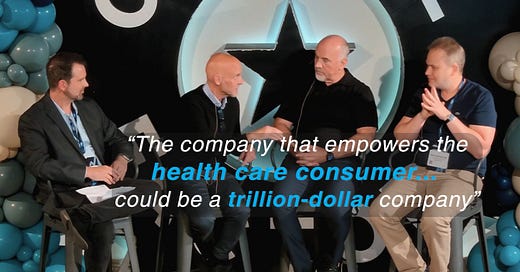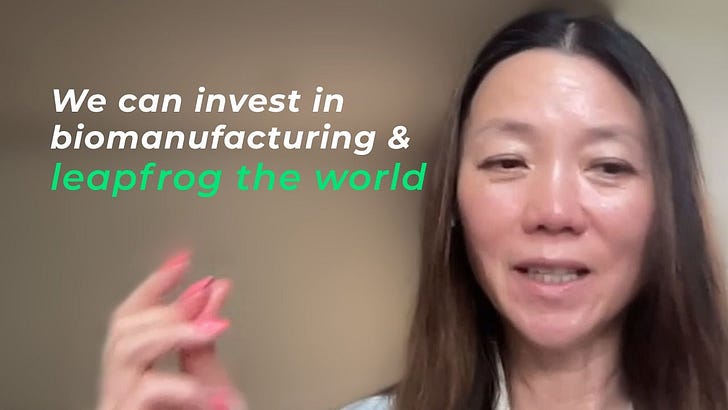What does it mean to build the future of Bio & Health at the frontier, and why is Austin the place to do it?
Recorded live at Health Supernova, this episode explores the deep structural shifts underway in bio, health, and tech. From trillion-dollar ambitions to FDA bottlenecks, from digital-first hospitals to the rise of cowboy talent in Bio & Health, Austin is staking a claim not as a follower but as the system and stack that comes next.
Three Takeaways
1. Austin’s Rise as a Bio & Health Frontier Powerhouse
What happens when bio innovation outpaces the systems meant to deliver it? In most places, nothing. But Austin is different. At the intersection of atoms, bits, and intelligence, it’s where the next trillion-dollar health company might not just be possible, but necessary.
2. We don’t need more assets. We need platforms producing integrated assets.
Standalone assets have driven biotech’s past and still play a role. But to create true transformation, we need companies that are more than holding vehicles. Platform-native startups are turning discovery engines into durable systems, changing the value equation.
3. Regulation is evolving. Integration is still a chokepoint.
The FDA still runs on PDFs in the age of AI, but it is evolving with new tools, frameworks, and technology. Even when a product clears the regulatory hurdle, it often stalls in the system. Clinical adoption, payment, and workflow design remain the biggest barriers to impact.
Links:
Highlights:
Austin’s Bio & Health Frontier Thesis
Can Austin build what healthcare won’t?
FDA still runs on PDFs
What would it take to build a trillion-dollar bio company?
Frontier talent are cowboys
Cost of the biotech winter
Digital-first hospital as a living lab
Why bio needs platforms, not just transformational assets
Integration is the real bottleneck
What's Next, Austin Bio & Health?
Steve Hahn: “The next major company that disrupts medicine and brings us 20, 30 years advanced over the next year.”
Charley Taylor: “Re-envisioning what healthcare, academic medicine can look like”
Micha Breakstone: “Make Austin into a real hub at the intersection of AI and biotech”
Guest Bios:
Stephen M. Hahn, M.D., is CEO-Partner of Flagship Pioneering and Chief Executive Officer of Harbinger Health. Steve joined Flagship in June 2021 as Chief Medical Officer of its Preemptive Health and Medicine Initiative, which is creating a new field that aims to protect, maintain, or improve people’s health before they get sick. Steve will continue as a strategic advisor to the Initiative.
Steve brings two decades of distinguished leadership in healthcare strategy, oncology medical practice, and translational/clinical research to this role. He served as the 24th U.S. Food and Drug Administration (FDA) Commissioner from 2019 to 2021 overseeing both COVID and non-COVID regulatory affairs, including therapeutics and vaccine development, devices, diagnostics, and clinical trials.
Prior to his FDA appointment, Steve served as chief medical executive at the world-renowned MD Anderson Cancer Center in Houston. Prior to his role as chief medical executive, he served as deputy president and chief operating officer where he was responsible for the day-to-day operations of the nation’s top cancer center, which included leading more than 21,000 employees and overseeing a $5.2 billion operating budget. Steve was elevated to the chief operating officer role after serving as division head, department chair, and professor of Radiation Oncology. Prior to his executive leadership roles at MD Anderson, Dr. Hahn was the leader of radiation oncology at the University of Pennsylvania’s Perelman School of Medicine.
Steve focused his translational research efforts on the evaluation of the tumor microenvironment, signal transduction pathways involved in tumor response to therapies and proton therapy. He has authored more than 220 peer-reviewed original research articles and has experience in medical product development.
Steve earned his M.D. from Temple University and received his B.A. in Biology from Rice University. He was an internal medicine resident at the University of California San Francisco before completing a fellowship and residency at the National Cancer Institute in Bethesda, Maryland.
Charles “Charley” Taylor, Ph.D., leads the Center for Computational Medicine jointly founded by Dell Medical School and the Oden Institute for Computational Engineering and Sciences. He is jointly appointed as the W. A. "Tex" Moncrief, Jr. Endowment in Simulation-Based Engineering and Sciences - Endowed Chair No. 7 - Computational Medicine at the Oden Institute and as a professor in the Department of Internal Medicine at Dell Med.
Under Taylor’s leadership, the center advances research in artificial intelligence, machine learning and digital twin technology, supporting capabilities that are a key component of the world-class, integrated academic medical center UT is building.
As part of his work, Taylor focuses on translating computational medicine research findings into real-world clinical approaches, working with industry partners to widely disseminate these solutions and maximize their impact. The center complements ongoing work in the Center for Computational Oncology and the Willerson Center for Cardiovascular Modeling and Simulation, further advancing collaborations between the Oden Institute and Dell Med.
Dr. Taylor is a Founder and Member of the Board of Directors of HeartFlow Inc. He was Chief Technology Officer at HeartFlow from 2010 to 2021 and then Chief Scientific Officer from 2021 to 2023. Dr. Taylor is also the Chairman of Ebenbuild, GmBh. Prior to HeartFlow, he was an Associate Professor in the Departments of Bioengineering and Surgery at Stanford University with courtesy faculty appointments in the Departments of Mechanical Engineering, Radiology and Pediatrics. He was also previously an Adjunct Professor of Computational Engineering and Sciences at the University of Texas, Austin and a Part-time Professor of Biomedical Engineering at the Technical University of Eindhoven. He is internationally recognized for his pioneering work over the last 30 years in combining computer simulation methods with medical imaging data for patient-specific modeling of blood flow to aid in the diagnosis and treatment of cardiovascular disease. Charles has published over 425 peer-reviewed journal and conference papers and has more than 300 issued patents worldwide.
He received his B.S. degree in Mechanical Engineering, M.S. degree in Mechanical Engineering and M.S. degree in Mathematics from Rensselaer Polytechnic Institute and a Ph.D. in Mechanical Engineering from Stanford University. Charles was elected into the American Institute for Medical and Biological Engineering in 2007 and the U.S. National Academy of Engineering in 2024.
Micha Breakstone, Ph.D., is a serial entrepreneur and AI pioneer. He co-founded Chorus.ai, which was acquired by ZoomInfo for $575 million and previously sold his NLP business unit to Intel. As founder and CEO of Somite.ai, he's developing AI foundation models for stem cell biology, collaborating with top researchers from MIT and Harvard Medical School. Micha holds a Ph.D. in Cognitive Science and has mentored over 130 Israeli startups, playing a key role in building several AI unicorns. After IPO-ing Somite, he dreams of writing a great novel.












Share this post